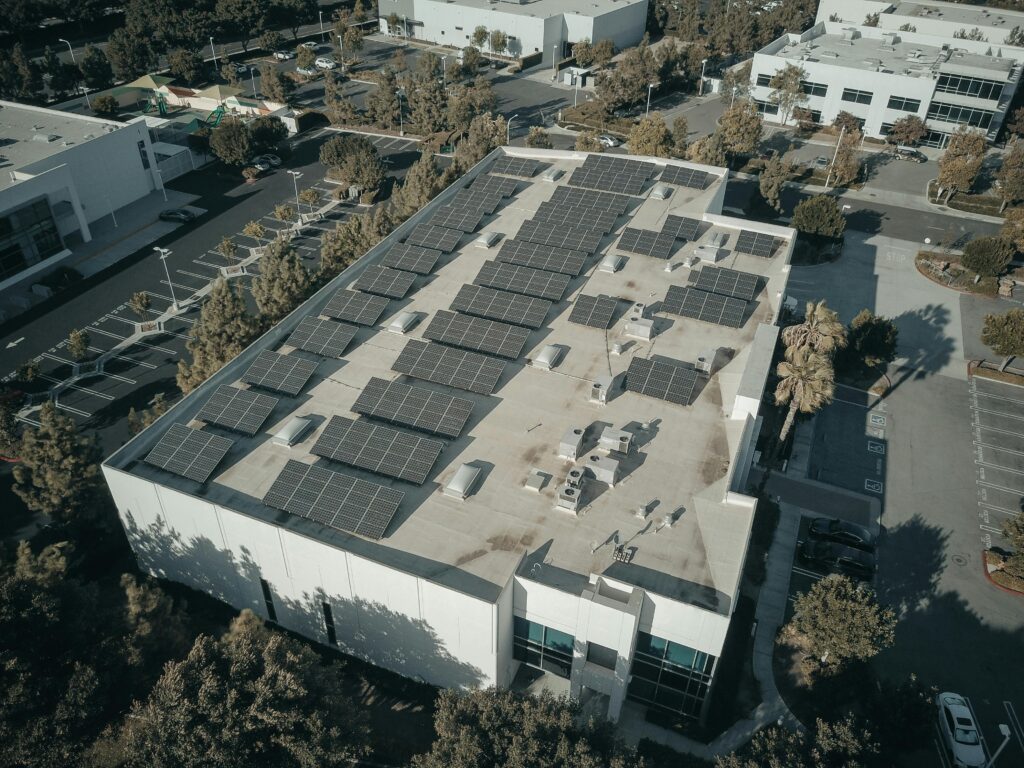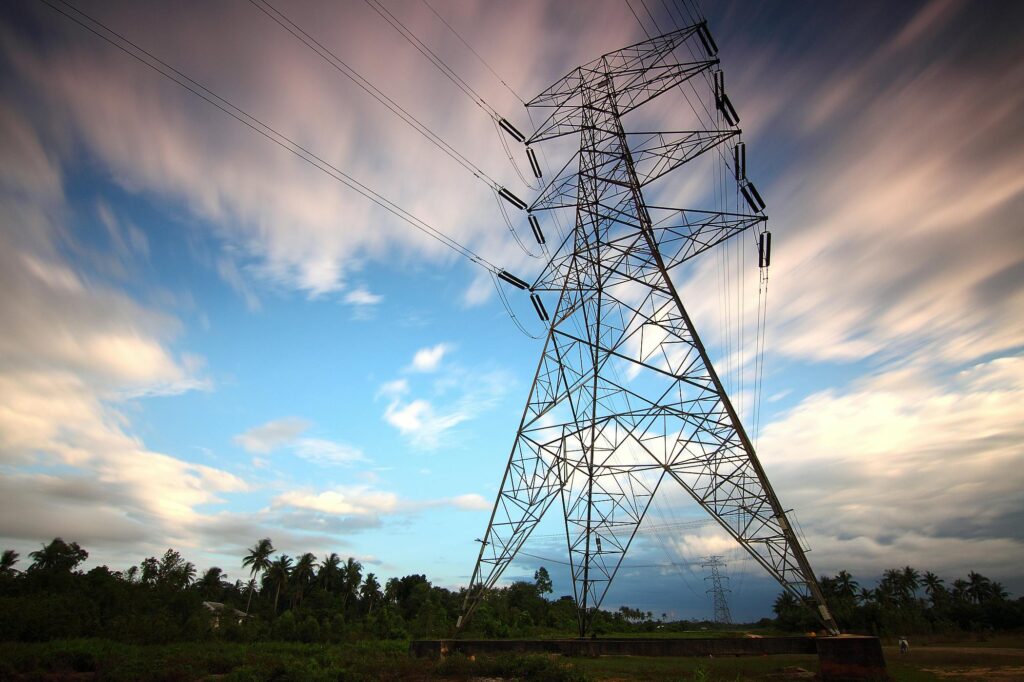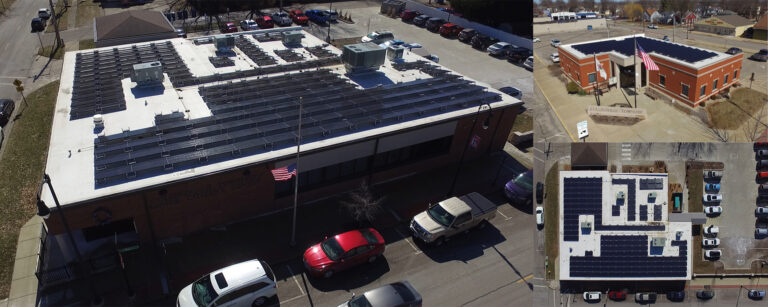How a Solar Investment Can Help Your Clients Save Money: A Guide for Commercial Accountants
As an accountant, you know your clients value one thing above all else—saving money. And if there’s one thing they love more than a great tax strategy, it’s finding ways to reduce ongoing operational expenses. By presenting your clients with the real, tangible financial benefits of solar, you’re offering a no-brainer solution. While sustainability is a major benefit, solar is also a powerful tool that helps businesses cut costs, generate long-term savings, and even unlock new revenue streams. Whether your client is in manufacturing, retail, or any other industry, the opportunities are clear: solar offers financial relief, tax incentives, and a path to energy independence.
Keep reading to learn why solar should be top of mind for your clients—and how you can help them make this smart investment.

A Real-World Example
Real-World Example: How Solar Can Save Your Business in Missouri
Say you’re a small manufacturing business in Missouri with an annual energy bill of $50,000. After designing a custom solar system using irradiance maps, we’ve found that to offset 100% of your annual electricity usage, you’d need a system that costs around $200,000.
Financial Breakdown:
- Total Solar Installation Cost: $200,000
- Federal Solar Tax Credit (30%): -$60,000
- Missouri Local Utility Incentive: $5,000 (Note: varies by region and utility provider)
- Bonus Depreciation (40% in the first year for 2025): -$80,000 (in the first year under MACRS)
- Out-of-Pocket Cost After Incentives: $135,000
The business qualifies for the 30% Federal Solar Tax Credit, saving $60,000 on the system’s cost. Additionally, Missouri businesses may be eligible for local utility incentives, which could add another $5,000 in savings, lowering the out-of-pocket cost to $135,000.
Moreover, businesses can take advantage of the 40% bonus depreciation under the Modified Accelerated Cost Recovery System (MACRS), allowing them to depreciate a small cost of the solar system in the first year. This can provide additional tax savings that can offset the cost of installation even further.
Annual Savings & Payback Period:
- The business will save around $50,000 annually on energy costs thanks to the solar system.
- The payback period—the time it takes to recoup the initial investment—is around 3 years.
- After the initial investment is paid off, the business will continue saving $40,000 per year for the life of the system, which can last 25+ years.
Long-Term Savings:
Over the next 25 years, this business will save more than $1 million on energy costs, making solar a highly profitable investment in the long run. In addition to financial savings, the business will reduce its carbon footprint and contribute to a cleaner environment.
State & Federal Incentives
One of the most compelling reasons businesses should consider solar is the combination of state and federal incentives that can drastically reduce the upfront cost of installation. These incentives not only make solar more affordable but also enhance the financial return on investment. However, it’s important to note that some policies, like net metering, are evolving and may affect future solar savings.
Federal Solar Investment Tax Credit (ITC): The 30% ITC remains a major benefit for businesses investing in solar, allowing them to deduct 30% of the system cost from their federal taxes. This incentive is available until 2032, making it a prime opportunity for businesses looking to invest now.
Illinois Solar for All Program: Illinois also offers specific programs, such as the Illinois Solar for All program, which helps cover a portion of installation costs for businesses. This program, focused on making solar accessible to underserved communities, offers substantial financial assistance and tax rebates.
Net Metering Changes: Net metering, which allows solar owners to sell excess electricity back to the grid and earn credits to offset future electricity bills, is undergoing changes in many states, including Illinois. In the past, businesses could receive full retail credit for the electricity they fed back into the grid. However, with changing policies, Illinois is transitioning to new net metering rules that could reduce the amount of credit businesses receive. This means that while businesses can still sell excess energy, the rate at which they’re compensated might be lower. As these changes roll out, it’s crucial for businesses to factor in how these adjustments will affect their overall savings and ROI. However, businesses can still benefit greatly by using solar to offset their own energy consumption, reducing reliance on the grid even as net metering compensation changes.
Solar Renewable Energy Credits (SRECs): In addition to net metering, businesses in Illinois can benefit from SRECs, which are credits earned by generating solar power. These credits can be sold to utilities or other entities, adding a potential revenue stream that can offset the cost of installation.
Accelerated Depreciation: Solar systems qualify for MACRS (Modified Accelerated Cost Recovery System), allowing businesses to depreciate the value of their solar system over a 5-year period. This can provide significant upfront tax deductions, further improving the financial case for solar.
How Net Metering Changes Could Affect Your Clients
With net metering policies changing, it’s important for businesses to be aware of how those changes might affect their savings potential. Although the changes may reduce the amount businesses receive for excess energy sold to the grid, the savings from using solar energy to offset in-house consumption will still provide significant financial benefits. If your clients are considering solar, it’s wise to project savings based on the current rates and factor in how the potential changes in net metering might impact the ROI over the next few years.

A Smart Financial Investment
Energy costs can be a major burden for businesses, especially in industries with high energy demands. Solar energy offers a way to dramatically cut energy expenses and secure predictable, low energy costs moving forward. By transitioning to solar, businesses reduce or even eliminate their electricity bills, depending on their energy consumption and the size of the system.
As an accountant, you can quickly assess how much a business is currently spending on energy by collecting a utility bill. From there, we can determine potential savings, break down cost benefits, and provide projections for how quickly a solar investment can pay off. Solar’s combination of upfront savings and ongoing cost reduction makes it a valuable tool for budget management and improving cash flow.
Impact on Property Values
In addition to reducing operational costs, businesses that invest in solar systems may see an increase in property value. The National Renewable Energy Laboratory (NREL) reports that homes and commercial properties equipped with solar systems can see higher resale values compared to properties without them. This could be an important consideration for businesses looking to sell or lease their buildings in the future.
For real estate investors or businesses planning to expand, installing solar can add considerable value to their property portfolio, making it a smart investment that pays dividends in the long term.
The Competitive Advantage
More and more businesses are recognizing the power of sustainability to build their brand image and stand out in the marketplace. By adopting solar energy, businesses not only reduce their costs but also align with consumer preferences, as 79% of U.S. consumers are more likely to purchase from companies that are environmentally responsible (according to Nielsen).
For businesses in the Midwest, where traditional industries such as manufacturing and agriculture are prominent, transitioning to solar energy can be seen as a way to modernize operations and future-proof the business. Consumers, employees, and investors are increasingly looking for businesses that are making strides toward sustainability—this shift could lead to stronger customer loyalty, employee satisfaction, and even better access to capital or grants from sustainability-focused investors.
As part of our commitment to sustainability in the Midwest, we’ve partnered with Uncommon Farms to provide businesses with tailored solutions that support the transition to solar energy. Through our initiative, Uncommon Energy, we offer farmers and agribusinesses the resources and expertise to reduce their energy costs and expenses. This collaboration helps farms take advantage of solar energy to offset high electricity costs, ensuring they remain competitive while embracing a more sustainable and cost-effective future.
Solar & Risk Mitigation
While many businesses may be concerned about the upfront cost of installing solar, the long-term savings and benefits actually help mitigate various risks. Rising utility prices and energy supply disruptions are key concerns for businesses that rely on a steady energy supply. Solar energy, especially when paired with battery storage, provides a self-sustaining energy model that reduces dependances on fluctuating energy markets.
This energy independence can help businesses avoid future price hikes and ensure their energy needs are consistently met, especially during power outages or periods of high demand. Additionally, as more states (including Illinois) move toward carbon reduction goals, businesses that have already transitioned to solar are ahead of regulatory changes. They may avoid future penalties related to carbon emissions and be better positioned to comply with evolving sustainability regulations.
Long-Term Maintenance and Cost Efficiency
Some businesses may be concerned about the maintenance costs associated with solar systems. However, most modern solar systems require very little maintenance once installed. The average solar panel has a lifespan of 25+ years, and many manufacturers offer warranties that cover defects and performance issues for 20-25 years. Routine cleaning and occasional checks are all that’s needed to keep systems functioning at optimal efficiency.
In fact, the low maintenance costs and reliability of solar systems make them a better option in the long term when compared to traditional energy sources, which can have fluctuating costs due to fuel prices, aging infrastructure, and environmental regulations. Solar, on the other hand, locks in predictable energy costs, giving businesses greater control over their budgets.
How Accountants Can Make a Case
As an accountant, it’s crucial to be able to present these benefits in a way that resonates with your clients. While cost savings are important, highlighting the long-term return on investment (ROI) and the additional revenue streams from things like SRECs and energy storage can strengthen your argument.
It’s also beneficial to offer businesses an energy audit or a solar feasibility study. Working with a solar provider like ARC, accountants can help businesses determine whether solar is a good fit for their specific needs, provide accurate financial projections, and guide them through the process of claiming available incentives. By offering these services, accountants can position themselves as trusted advisors helping clients make smart, informed decisions.
We are currently working with Uncommon Farms to provide this assistance to their clients, we’d be happy to craft a personalized presentation for your clients. Contact us today if you’d like to explore more opportunities to work together.
Next Steps
The time to act is now. With most large installations, including permitting, construction, engineering, and more, we can complete most commercial projects in 5 months or less. Once the systems are switched on, your clients will start generating savings immediately—and as energy prices continue to rise, those savings will grow.
It’s important to act quickly because the Federal Solar Investment Tax Credit (ITC) is set to decrease in the coming years. Systems installed between 2022 and 2032 are eligible for a 30% tax credit. However, starting in 2033, the ITC will drop to 26%, and in 2034, it will further drop to 22%. After 2034, the ITC will expire unless Congress renews it. Delaying your decision means losing out on valuable tax incentives that could significantly reduce the upfront cost of installation.
At ARC, we specialize in tailored solar solutions that meet the unique needs of your clients. Whether it’s understanding available incentives, calculating ROI, or providing ongoing support, we’re here to guide your clients through the process and ensure they make informed, impactful decisions.



